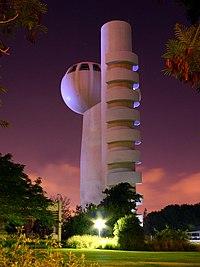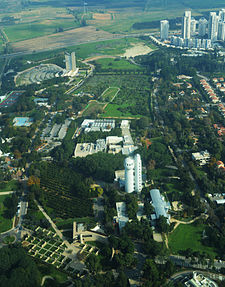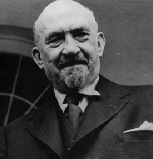Weizmann Institute of Science: Difference between revisions
The Weizmann Institute awards degrees in biochemistry. ''Biological chemistry'' is obsolete terminology. |
mNo edit summary |
||
| Line 40: | Line 40: | ||
}} |
}} |
||
[[Image:Weizmann accelerator.jpg|thumb|200px|Koffler accelerator at night]] |
[[Image:Weizmann accelerator.jpg|thumb|200px|Koffler accelerator at night]] |
||
The '''Weizmann Institute of Science''' ({{lang-he|מכון ויצמן למדע}} ''Machon Weizmann LeMada'') is a [[Public university|public]] [[research university]] in [[Rehovot]], [[Israel]]. It differs from other [[List of Israeli universities and colleges|Israeli universities]] in that it offers only [[graduate student|graduate]] and |
The '''Weizmann Institute of Science''' ({{lang-he|מכון ויצמן למדע}} ''Machon Weizmann LeMada'') is a [[Public university|public]] [[research university]] in [[Rehovot]], [[Israel]]. It differs from other [[List of Israeli universities and colleges|Israeli universities]] in that it offers only [[graduate student|graduate]] and postgraduate tutelage in the sciences. |
||
It is a multidisciplinary research center, with around 2,500 scientists, postdoctoral fellows, Ph.D. and M.Sc. students, and scientific, technical, and administrative staff working at the Institute.<ref>[http://www.weizmann.ac.il/acadaff/Scientific_Activities/current/weizmann.html Weizmann Institute of Science - Scientific Activities 2010]</ref><ref>[http://www.weizmann.ac.il/pages/facts-and-figures Weizmann Institute of Science - Facts and Figures]</ref> |
It is a multidisciplinary research center, with around 2,500 scientists, postdoctoral fellows, Ph.D. and M.Sc. students, and scientific, technical, and administrative staff working at the Institute.<ref>[http://www.weizmann.ac.il/acadaff/Scientific_Activities/current/weizmann.html Weizmann Institute of Science - Scientific Activities 2010]</ref><ref>[http://www.weizmann.ac.il/pages/facts-and-figures Weizmann Institute of Science - Facts and Figures]</ref> |
||
| Line 48: | Line 48: | ||
==History== |
==History== |
||
[[File:PikiWiki Israel 11659 Yad Chaim Weizmann.JPG|thumb|Weizmann residence, designed by [[Erich Mendelsohn]]]] |
[[File:PikiWiki Israel 11659 Yad Chaim Weizmann.JPG|thumb|Weizmann residence, designed by [[Erich Mendelsohn]]]] |
||
Founded in 1934 by [[Chaim Weizmann]] and his first team, among them [[Benjamin M. Bloch]], as the [[Israel Sieff|Daniel Sieff]] Research Institute, it was renamed the Weizmann Institute of Science in his honor on November 2, 1949. Before he became President of the State of Israel, Weizmann pursued his research in [[organic chemistry]] at its laboratories. The Weizmann Institute presently has about 2,500 students, postdoctoral fellows, staff, and faculty, and awards M.Sc. and Ph.D. degrees in [[mathematics]], [[computer science]], [[physics]], [[chemistry]], [[biochemistry]] and [[biology]], as well as several interdisciplinary programs.<ref name="Sci2006">[http://www.weizmann.ac.il/acadaff/Scientific_Activities/current/weizmann.html The Weizmann Institute of Science<!-- Bot generated title -->]</ref> The symbol of the Weizmann Institute of Science is the |
Founded in 1934 by [[Chaim Weizmann]] and his first team, among them [[Benjamin M. Bloch]], as the [[Israel Sieff|Daniel Sieff]] Research Institute, it was renamed the Weizmann Institute of Science in his honor on November 2, 1949. Before he became President of the State of Israel, Weizmann pursued his research in [[organic chemistry]] at its laboratories. The Weizmann Institute presently has about 2,500 students, postdoctoral fellows, staff, and faculty, and awards M.Sc. and Ph.D. degrees in [[mathematics]], [[computer science]], [[physics]], [[chemistry]], [[biochemistry]], and [[biology]], as well as several interdisciplinary programs.<ref name="Sci2006">[http://www.weizmann.ac.il/acadaff/Scientific_Activities/current/weizmann.html The Weizmann Institute of Science<!-- Bot generated title -->]</ref> The symbol of the Weizmann Institute of Science is the multibranched ''[[Ficus]]'' tree.<ref>[http://www.weizmann.ac.il/resdev/Weizmann Institution resource development]</ref> |
||
In 2011, the magazine ''[[The Scientist]]'' rated the Weizmann Institute as the best place in the world to work in academia among non-US institutions.<ref name="TheScientist2011">[http://the-scientist.com/2011/07/01/best-places-to-work-academia-2011/]</ref> In 2012, the Weizmann Institute made Shanghai Jiao Tong University's list of the world’s 100 top universities in 93rd place<ref>[http://www.haaretz.com/news/national/israel-s-hebrew-u-technion-and-weizmann-make-list-of-top-100-international-universities.premium-1.458478 Israel's Hebrew U, Technion and Weizmann make list of top 100 international universities]</ref> and moved up to 92nd in 2013.<ref>{{cite web|title=Academic Ranking of World Universities|url=http://www.shanghairanking.com/ARWU2013.html|publisher=Center for World-Class Universities of Shanghai Jiao Tong University|accessdate=13 September 2013}}</ref> |
In 2011, the magazine ''[[The Scientist]]'' rated the Weizmann Institute as the best place in the world to work in academia among non-US institutions.<ref name="TheScientist2011">[http://the-scientist.com/2011/07/01/best-places-to-work-academia-2011/]</ref> In 2012, the Weizmann Institute made Shanghai Jiao Tong University's list of the world’s 100 top universities in 93rd place<ref>[http://www.haaretz.com/news/national/israel-s-hebrew-u-technion-and-weizmann-make-list-of-top-100-international-universities.premium-1.458478 Israel's Hebrew U, Technion and Weizmann make list of top 100 international universities]</ref> and moved up to 92nd in 2013.<ref>{{cite web|title=Academic Ranking of World Universities|url=http://www.shanghairanking.com/ARWU2013.html|publisher=Center for World-Class Universities of Shanghai Jiao Tong University|accessdate=13 September 2013}}</ref> |
||
| Line 55: | Line 55: | ||
[[File:Weizmann Institute of Science Aerial View.jpg|The campus|thumb|225px]] |
[[File:Weizmann Institute of Science Aerial View.jpg|The campus|thumb|225px]] |
||
[[File:Weizmann Institute of Science.JPG|The campus|thumb|225px]] |
[[File:Weizmann Institute of Science.JPG|The campus|thumb|225px]] |
||
In addition to its academic programs, the Weizmann Institute runs programs for youth, including science clubs, camps and competitions. The Bessie F. Lawrence International Summer Science Institute accepts high |
In addition to its academic programs, the Weizmann Institute runs programs for youth, including science clubs, camps, and competitions. The Bessie F. Lawrence International Summer Science Institute accepts high-school graduates from all over the world for a four-week, science-based [[summer camp]]. The Clore Garden of Science, which opened in 1999, is the world’s first completely interactive outdoor [[science museum]].<ref name="Sci2006" /><ref>[http://www.israel.org/MFA/Israel%20beyond%20the%20conflict/The%20Clore%20Garden%20of%20Science%20-%20A%20Worlds%20First The Clore Garden of Science – A Worlds First<!-- Bot generated title -->]</ref> |
||
==Awards== |
==Awards== |
||
Three Weizmann Institute researchers won the [[Turing Award]] |
Three Weizmann Institute researchers won the [[Turing Award]]: [[Amir Pnueli]] in 1996,<ref>[http://awards.acm.org/citation.cfm?id=5846946&srt=year&year=1996&aw=140&ao=AMTURING "ACM Award Citation / Amir Pnueli" at acm.org]</ref> [[Adi Shamir]] in 2002<ref>[http://awards.acm.org/citation.cfm?id=0028491&srt=year&year=2002&aw=140&ao=AMTURING "ACM Award Citation / Adi Shamir" at acm.org]</ref> and [[Shafi Goldwasser]] in 2012.<ref>[http://www.acm.org/news/featured/awards/turing-award-2012]</ref> |
||
[[Ada Yonath]] won the [[Wolf Prize]] for Chemistry in 2006 and the [[Nobel Prize]] for Chemistry in 2009. Several faculty have been awarded Wolf Prizes in Medicine, including [[Leo Sachs]] (1980), [[Meir Wilchek]] (1987) and [[Michael Sela]] and [[Ruth Arnon]] (shared, 1998). |
[[Ada Yonath]] won the [[Wolf Prize]] for Chemistry in 2006 and the [[Nobel Prize]] for Chemistry in 2009. Several faculty have been awarded Wolf Prizes in Medicine, including [[Leo Sachs]] (1980), [[Meir Wilchek]] (1987) and [[Michael Sela]] and [[Ruth Arnon]] (shared, 1998). |
||
| Line 75: | Line 75: | ||
*[[Nahum Sonenberg]], biochemist at McGill University |
*[[Nahum Sonenberg]], biochemist at McGill University |
||
*[[Chaim L. Pekeris]], geophysicist |
*[[Chaim L. Pekeris]], geophysicist |
||
*[[Amir Pnueli]], computer scientist, |
*[[Amir Pnueli]], computer scientist, Turing Award (1996) |
||
*[[Michael Sela]], immunologist |
*[[Michael Sela]], immunologist |
||
*[[Adi Shamir]], cryptographer, [[Turing Award]] (2002) |
*[[Adi Shamir]], cryptographer, [[Turing Award]] (2002) |
||
*[[Igal Talmi]], physicist |
*[[Igal Talmi]], physicist |
||
*[[Benjamin Elazari Volcani]] |
*[[Benjamin Elazari Volcani]] discovered life in the Dead Sea and pioneered biological silicon research. |
||
*[[Chaim Weizmann]], chemist, first |
*[[Chaim Weizmann]], chemist, first President of the State of Israe] |
||
*[[Ada Yonath]], crystallographer, |
*[[Ada Yonath]], crystallographer, Nobel Prize in Chemistry (2009) |
||
*[[Michael Levitt]], chemical physics, presently at [[Stanford University]]: |
*[[Michael Levitt]], chemical physics, presently at [[Stanford University]]: Nobel Prize in Chemistry (2013) |
||
*[[Arieh Warshel]], chemical physics, presently at [[University of Southern California]]: |
*[[Arieh Warshel]], chemical physics, presently at [[University of Southern California]]: Nobel Prize in Chemistry (2013) |
||
*[[David Wallach]], biochemist |
*[[David Wallach]], biochemist |
||
*[[Uri Alon]], [[systems biology|systems biologist]] |
*[[Uri Alon]], [[systems biology|systems biologist]] |
||
| Line 101: | Line 101: | ||
*[[Daniel Zajfman]] (2006–present) |
*[[Daniel Zajfman]] (2006–present) |
||
The |
The nonscientists Abba Eban and Meyer Weisgal were assisted by Scientific Directors, as was Weizmann himself owing to his duties as the first President of Israel. The following persons held the position of Scientific Director: |
||
*[[Ernst David Bergmann]] (1949-1951) |
*[[Ernst David Bergmann]] (1949-1951) |
||
*[[Amos de Shalit]] (1960-1961 and 1966-1968) |
*[[Amos de Shalit]] (1960-1961 and 1966-1968) |
||
| Line 114: | Line 114: | ||
*[[Christian B. Anfinsen]] (1916–95) was an American biochemist |
*[[Christian B. Anfinsen]] (1916–95) was an American biochemist |
||
*[[Ofer Biham]], faculty member at [[the Racah Institute of Physics]] of the Hebrew University of Jerusalem |
*[[Ofer Biham]], faculty member at [[the Racah Institute of Physics]] of the Hebrew University of Jerusalem |
||
*[[Arie Belldegrun|Arie S. Belldegrun]] (born 1949), director of the [[UCLA]] Institute of [[Urology|Urologic]] [[Oncology]] and is |
*[[Arie Belldegrun|Arie S. Belldegrun]] (born 1949), director of the [[UCLA]] Institute of [[Urology|Urologic]] [[Oncology]] and is Professor and Chief of Urologic Oncology at the [[David Geffen School of Medicine]]<ref>http://people.healthsciences.ucla.edu/institution/personnel?personnel_id=8731</ref><ref>http://www.usrf.org/PCSPES/belldegrun.shtml</ref> |
||
*[[Achi Brandt]] (born 1938), mathematician, noted for pioneering contributions to multigrid methods |
*[[Achi Brandt]] (born 1938), mathematician, noted for pioneering contributions to multigrid methods |
||
*[[Ehud Gazit]], biochemist and nanotechnologist, and |
*[[Ehud Gazit]], biochemist and nanotechnologist, and professor at the Department of Molecular Microbiology & Biotechnology, Tel Aviv University |
||
*[[Alexander Goldfarb (biologist and activist)|Alexander Goldfarb]], (born 1947), microbiologist, activist, and author |
*[[Alexander Goldfarb (biologist and activist)|Alexander Goldfarb]], (born 1947), microbiologist, activist, and author |
||
*[[Anders Levermann]], climate scientist at the Potsdam Institute for Climate Impact Research and Professor of the Dynamics of the Climate System at Potsdam University |
*[[Anders Levermann]], climate scientist at the Potsdam Institute for Climate Impact Research and Professor of the Dynamics of the Climate System at Potsdam University |
||
| Line 122: | Line 122: | ||
*[[Alexander Levitzki]] (born 1940), biochemist |
*[[Alexander Levitzki]] (born 1940), biochemist |
||
*[[Miron Livny]], senior researcher and professor specializing in distributed computing at the University of Wisconsin–Madison |
*[[Miron Livny]], senior researcher and professor specializing in distributed computing at the University of Wisconsin–Madison |
||
*[[Henry Markram]] (born 1962), |
*[[Henry Markram]] (born 1962), director of the Blue Brain Project at École Polytechnique Fédérale de Lausanne |
||
*[[Amir Pnueli]] (1941–2009), computer scientist |
*[[Amir Pnueli]] (1941–2009), computer scientist |
||
*[[Giora Ram]] (born 1947), interdisciplinary scientist in physics, mathematics, computer science, and medicine |
*[[Giora Ram]] (born 1947), interdisciplinary scientist in physics, mathematics, computer science, and medicine |
||
Revision as of 00:29, 29 October 2014
מכון ויצמן למדע | |
 | |
| Type | Public |
|---|---|
| Established | 1934 |
| President | Prof. Daniel Zajfman |
Academic staff | 952 |
| Students | 1,082 |
| Postgraduates | 356 |
| 692 | |
| Location | , |
| Campus | Urban |
| Postdoctoral fellows | 220 |
| Website | www.weizmann.ac.il |
| File:Weizmann Institute of Science logo.svg | |

The Weizmann Institute of Science (Hebrew: מכון ויצמן למדע Machon Weizmann LeMada) is a public research university in Rehovot, Israel. It differs from other Israeli universities in that it offers only graduate and postgraduate tutelage in the sciences.
It is a multidisciplinary research center, with around 2,500 scientists, postdoctoral fellows, Ph.D. and M.Sc. students, and scientific, technical, and administrative staff working at the Institute.[1][2]
Three Nobel laureates and three Turing Award laureates have been associated with the Weizmann Institute of Science.
History

Founded in 1934 by Chaim Weizmann and his first team, among them Benjamin M. Bloch, as the Daniel Sieff Research Institute, it was renamed the Weizmann Institute of Science in his honor on November 2, 1949. Before he became President of the State of Israel, Weizmann pursued his research in organic chemistry at its laboratories. The Weizmann Institute presently has about 2,500 students, postdoctoral fellows, staff, and faculty, and awards M.Sc. and Ph.D. degrees in mathematics, computer science, physics, chemistry, biochemistry, and biology, as well as several interdisciplinary programs.[3] The symbol of the Weizmann Institute of Science is the multibranched Ficus tree.[4]
In 2011, the magazine The Scientist rated the Weizmann Institute as the best place in the world to work in academia among non-US institutions.[5] In 2012, the Weizmann Institute made Shanghai Jiao Tong University's list of the world’s 100 top universities in 93rd place[6] and moved up to 92nd in 2013.[7]
Youth programs


In addition to its academic programs, the Weizmann Institute runs programs for youth, including science clubs, camps, and competitions. The Bessie F. Lawrence International Summer Science Institute accepts high-school graduates from all over the world for a four-week, science-based summer camp. The Clore Garden of Science, which opened in 1999, is the world’s first completely interactive outdoor science museum.[3][8]
Awards
Three Weizmann Institute researchers won the Turing Award: Amir Pnueli in 1996,[9] Adi Shamir in 2002[10] and Shafi Goldwasser in 2012.[11]
Ada Yonath won the Wolf Prize for Chemistry in 2006 and the Nobel Prize for Chemistry in 2009. Several faculty have been awarded Wolf Prizes in Medicine, including Leo Sachs (1980), Meir Wilchek (1987) and Michael Sela and Ruth Arnon (shared, 1998).
Distinguished faculty
- Amos de-Shalit, physicist
- Oded Goldreich, computer scientist
- Shafrira Goldwasser, computer scientist two time winner of the Godel Prize (1993 and 2001), and the Turing Award (2012)
- Haim Harari, theoretical physicist
- Yoseph Imry, theoretical physicist
- David Harel (born 1950), computer scientist
- Ephraim Katzir, biophysicist, fourth President of the State of Israel
- Shneior Lifson, physicist
- Harry J. Lipkin, physicist
- Mordehai Milgrom, physicist
- Nahum Sonenberg, biochemist at McGill University
- Chaim L. Pekeris, geophysicist
- Amir Pnueli, computer scientist, Turing Award (1996)
- Michael Sela, immunologist
- Adi Shamir, cryptographer, Turing Award (2002)
- Igal Talmi, physicist
- Benjamin Elazari Volcani discovered life in the Dead Sea and pioneered biological silicon research.
- Chaim Weizmann, chemist, first President of the State of Israe]
- Ada Yonath, crystallographer, Nobel Prize in Chemistry (2009)
- Michael Levitt, chemical physics, presently at Stanford University: Nobel Prize in Chemistry (2013)
- Arieh Warshel, chemical physics, presently at University of Southern California: Nobel Prize in Chemistry (2013)
- David Wallach, biochemist
- Uri Alon, systems biologist
Presidents


- Chaim Weizmann (1949–1952; 1934–1952 if predecessor Daniel Sieff Institute included)
- Abba Eban (1959–1966)
- Meyer Weisgal (1966–1970; also Acting Director 1952-1959)
- Albert Sabin (1970–1972)
- Israel Dostrovsky (1972–1975)
- Michael Sela (1975–1985)
- Aryeh Dvoretzky (1985–1988)
- Haim Harari (1988–2001)
- Ilan Chet (2001–2006)
- Daniel Zajfman (2006–present)
The nonscientists Abba Eban and Meyer Weisgal were assisted by Scientific Directors, as was Weizmann himself owing to his duties as the first President of Israel. The following persons held the position of Scientific Director:
- Ernst David Bergmann (1949-1951)
- Amos de Shalit (1960-1961 and 1966-1968)
- Shneior Lifson (1962-1966)
- Gerhard M. J. Schmidt (1969)
Full list of past officers of the Weizmann Institute
Notable alumni
- Amikam Aharoni (1929–2002), physicist
- Dorit Aharonov (born 1970), computer scientist specializing in quantum computing
- Christian B. Anfinsen (1916–95) was an American biochemist
- Ofer Biham, faculty member at the Racah Institute of Physics of the Hebrew University of Jerusalem
- Arie S. Belldegrun (born 1949), director of the UCLA Institute of Urologic Oncology and is Professor and Chief of Urologic Oncology at the David Geffen School of Medicine[12][13]
- Achi Brandt (born 1938), mathematician, noted for pioneering contributions to multigrid methods
- Ehud Gazit, biochemist and nanotechnologist, and professor at the Department of Molecular Microbiology & Biotechnology, Tel Aviv University
- Alexander Goldfarb, (born 1947), microbiologist, activist, and author
- Anders Levermann, climate scientist at the Potsdam Institute for Climate Impact Research and Professor of the Dynamics of the Climate System at Potsdam University
- Mario Livio (born 1945), astrophysicist
- Alexander Levitzki (born 1940), biochemist
- Miron Livny, senior researcher and professor specializing in distributed computing at the University of Wisconsin–Madison
- Henry Markram (born 1962), director of the Blue Brain Project at École Polytechnique Fédérale de Lausanne
- Amir Pnueli (1941–2009), computer scientist
- Giora Ram (born 1947), interdisciplinary scientist in physics, mathematics, computer science, and medicine
- Shmuel Safra, Professor of Computer Science at Tel Aviv University
- Josip Schlessinger (born 1945), biochemist and biophysician
- Nathan Seiberg, physicist
- Adi Shamir (born 1952), cryptographer
- Arieh Warshel, Nobel prize in chemistry (2013)
See also
References
- ^ Weizmann Institute of Science - Scientific Activities 2010
- ^ Weizmann Institute of Science - Facts and Figures
- ^ a b The Weizmann Institute of Science
- ^ Institution resource development
- ^ [1]
- ^ Israel's Hebrew U, Technion and Weizmann make list of top 100 international universities
- ^ "Academic Ranking of World Universities". Center for World-Class Universities of Shanghai Jiao Tong University. Retrieved 13 September 2013.
- ^ The Clore Garden of Science – A Worlds First
- ^ "ACM Award Citation / Amir Pnueli" at acm.org
- ^ "ACM Award Citation / Adi Shamir" at acm.org
- ^ [2]
- ^ http://people.healthsciences.ucla.edu/institution/personnel?personnel_id=8731
- ^ http://www.usrf.org/PCSPES/belldegrun.shtml
